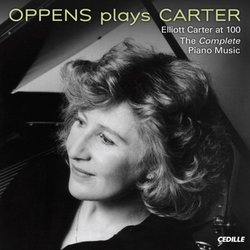Ursula Oppens Plays Elliott Carter
Robin Friedman | Washington, D.C. United States | 11/19/2009
(5 out of 5 stars)
"This CD of the complete music for solo piano by Elliott Carter, (b. 1908) offers the opportunity to get to know some of the most difficult and challenging works, musically and technically, for the instrument in American music. Although he has not written extensively for solo piano, Carter's two large works for the instrument, the Sonata (1946) and the "Night Fantasies" (1980) are extraordinary compositions. The pianist Ursula Oppens is a long-time champion of Carter and other contemporary composers. During last year's centennial of Carter's birth, Oppens performed his works tirelessly in recitals as well as releasing this disk on the Cedille label. She offers here what may well become definitive readings of this music.
In his youth, Carter was a friend and protégé of Charles Ives, and he went on to a long and varied career. Carter's two-movement piano sonata was written before he found his own distinctive musical voice. It belongs with the earlier American piano sonatas of Ives, Copland, and Barber and shares a great deal with them. Carter's sonata is clearly a 20th Century work. The sonata opens with a slow, dramatic theme marked "Maestoso" before moving to a faster and more rhythmically and harmonically challenging second group. Both themes are developed and intertwined as the movement proceeds, almost as in the manner of a more traditional sonata. The second movement of the sonata is highlighted by a lengthy, furious fugue surrounded by more quiet opening and closing material. This sonata is a difficult and imposing.
When Carter wrote his second lengthy piano piece, the "Night Fantasies", he had mastered the musical style that he had developed beginning in the early 1950s. Carter described this work as a "piano piece of continually changing moods, suggesting the fleeting thoughts and feelings that pass through the mind during a period of wakefulness and night." This work makes heavy demands on the performer and listener. The work includes unusual atonal harmonies based upon the use of what are described as 88 separate all-interval chords. The work is also rhythmically complex as the two hands of the piano play throughout in different tempos. They come together only two times during the work. The rhythm and the mood of the piece shift repeatedly and abruptly during its course. The themes are fragmentary and shifting but they build to the development of a mood. For all its difficulty, "Night Fantasies" is romantic rather than cerebral in character. In listening to it several times, I responded to its idiom without troubling myself with the technicalities of its composition. The music captures for me the change, restlessness, complexity, and moods of life in a large American city at night. It is captivating.
The remaining works on this CD are shorter pieces that generally date from the latter part of Carter's career. They show a good deal of whimsy. The best of these works include "90 +" which dates from 1994 and was composed to celebrate the 90th birthday of a friend. It features 90 and more staccato notes played over a shifting chordal background. "Matribute" (2007), begins with a light fragmentary theme which picks up in intensity. The work was written to celebrate the birthday of the mother of the famous conductor, James Levine. The "Two Thoughts about the Piano" (2005-2006), consist of two contrasting pieces, the first of which "Intermittences"is full of heavy, discordant chords and shifting rhythms while the second, "Catenaires" is a rapid linear, perpetuum mobile piece with long passages consisting of a succession of single notes moving over the entire keyboard.
Many music lovers remain reluctant to approach these difficult pieces. Carter's is a distinct voice which I think tries to capture the liveliness, change and passion of modern life with romance but without sentimentality. This is music for adventurous listeners who are not put off by discordance and for those listeners wanting to understand a contemporary musical idiom.
Robin Friedman"

